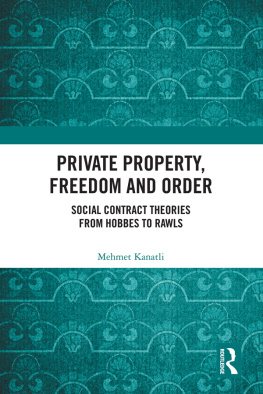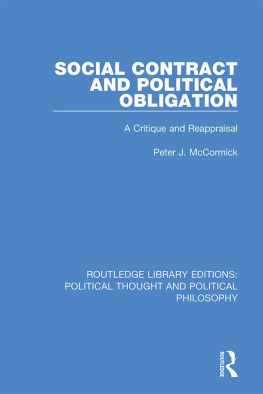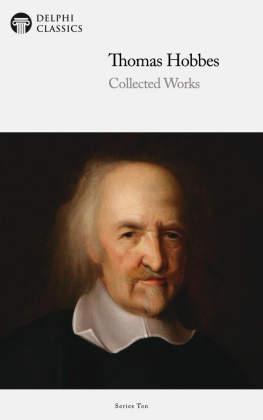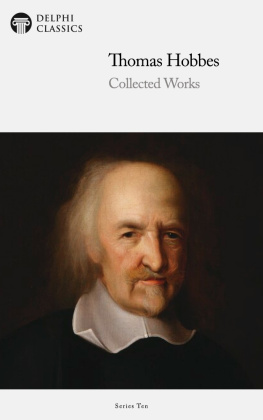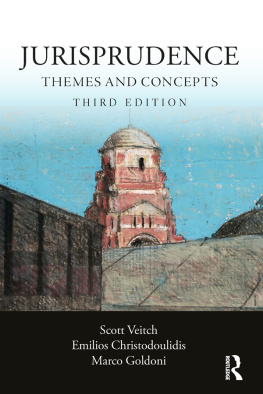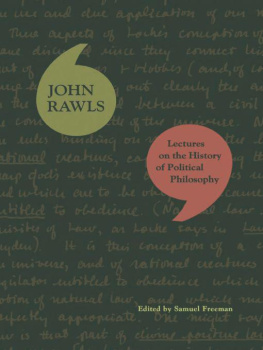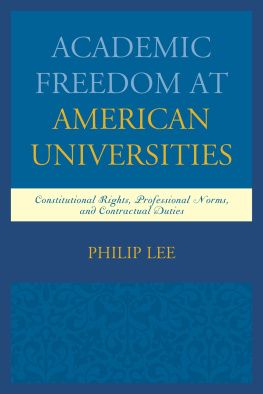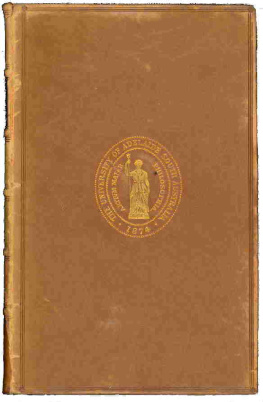Private Property, Freedom and Order
This book looks at how the ideas of freedom, property, and order are expressed in modern social contract theories (SCTs). Drawing on the theories of Hobbes, Locke, Rousseau, and Rawls, it studies how notions of freedom promulgated by these SCTs invariably legitimize and defend the private ownership of the means of production. It argues that capitalisms impact on individual dependence and economic inequality still stems from this model, ultimately working in favor of proprietors.
The author highlights the problematic nature of SCTs, which work as ideological mechanisms put forward under the guise of formal equality and formal freedom, by focusing on the historical and social context behind them. From a methodological point of view, the author presents a de-ideologization of the contractarian issue and provides insight into the political layers within the discourse of individualism, human nature, and morality shaping the outer corners of contractarian theory.
An important intervention in the study of SCTs, this volume will be of great interest to scholars and researchers of political and social theory, sociology, political history, and political philosophy.
Mehmet Kanatli is Lecturer at the Department of Political Science and Public Administration at Hitit University, Turkey. He received his MA from the Political Theory program at Manchester University, UK, and his PhD from the Department of Political Science and Public Administration at Middle East Technical University, Turkey. He is interested in a wide range of social science disciplines from international relations to political theory, with a specialization in theories of democracies, political ideologies, and political thought.
First published 2022
by Routledge
2 Park Square, Milton Park, Abingdon, Oxon OX14 4RN
and by Routledge
605 Third Avenue, New York, NY 10158
Routledge is an imprint of the Taylor & Francis Group, an informa business
2022 Mehmet Kanatli
The right of Mehmet Kanatli to be identified as author of this work has been asserted in accordance with sections 77 and 78 of the Copyright, Designs and Patents Act 1988.
All rights reserved. No part of this book may be reprinted or reproduced or utilised in any form or by any electronic, mechanical, or other means, now known or hereafter invented, including photocopying and recording, or in any information storage or retrieval system, without permission in writing from the publishers.
Trademark notice: Product or corporate names may be trademarks or registered trademarks, and are used only for identification and explanation without intent to infringe.
British Library Cataloguing-in-Publication Data
A catalogue record for this book is available from the British Library
Library of Congress Cataloging-in-Publication Data
A catalog record for this book has been requested
ISBN: 978-0-367-74742-8 (hbk)
ISBN: 978-0-367-74745-9 (pbk)
ISBN: 978-1-003-15934-6 (ebk)
DOI: 10.4324/9781003159346
Typeset in Sabon
by Apex CoVantage, LLC
To my son Mirza
Contents
1 The conceptual framework of private property and its relation with freedom and order
2 A critical evaluation of the main elements of contractarian approach
3 The relation between private property, freedom, and order in pioneers of the modern social contract theories: Hobbes and Locke
4 Eighteenth century of France and Rousseauan formulation of private property, freedom, and order
5 Revitalization of social contract theory in terms of the relation between private property, freedom, and order: the case of John Rawls
Conclusion
- 1 The conceptual framework of private property and its relation with freedom and order
- 2 A critical evaluation of the main elements of contractarian approach
- 3 The relation between private property, freedom, and order in pioneers of the modern social contract theories: Hobbes and Locke
- 4 Eighteenth century of France and Rousseauan formulation of private property, freedom, and order
- 5 Revitalization of social contract theory in terms of the relation between private property, freedom, and order: the case of John Rawls
- Conclusion
Guide
Tables
1.1 Definitional ambiguities of private property
3.1 Social classes and monthly incomes in England between 1600 and 1650
4.1 Social classes and monthly incomes in France between 1750 and 1800
5.1 The ratio of the number of people living below the poverty line to the total population between the periodical years 1970 and 1986
5.2 The ratio of the number of people living below the poverty line to the total population between the periodical years 1987 and 1998
5.3 A possible implementation of economy policy in a property-owning democratic system in which private property-based free-market economy is applied
Foreword
During the end of the sixteenth and the beginning of the seventeenth century, the metaphysical image of the world became deeply challenged by a new understanding of the importance of the individual, his location and significance for defining, giving meaning to, and structuring the world. As a matter of fact, one can state that this transformation process started already hundreds of years before. In the early renaissance humanism and the later renaissance periods homo faber, the individual being actively involved in politico-social, economic, legal, and cultural changes entered the stage of history. The world began to be seen in all its facets and in its unity within the framework of social dynamics, within the framework of earthly, that means calculable causalities manifested in an understanding of ordered motion independent from the one and only almighty and eternal causal power of God. Thomas Hobbess mechanical materialism starts from the idea that the world can be perceived and constructed on the basis of the new natural sciences of Galileo Galilei, Nicolaus Copernicus, and Johannes Kepler. But the seventeenth century as the Age of Science did not only consist of a naturalist ontology of the world in the field of natural sciences. Also the study of (positive) law with its roots in Greek and Roman Antiquity, and the branch of medicine (as the investigation of the human body in a nonmystified way) do reflect the earlier mentioned new image of the world with its conscious, that means rational, inhabitants. State and society began to embed more and more diversified structures to be handled by the individuals. Thus, contractual relations became the new mind of subject-subject and subject-object relations. This mind is still ongoing in the contemporary world: If one would ask for a general and universal term which all legal systems within the framework of positive law have in common, one would without doubt say Contract Law.
In the history of political thought contract theoreticians have tried to conceptualize the processes mentioned earlier. The free will (as the manifestation of freedom as such) of the rational individual aiming at constructing social order in order to protect himself from incalculable natural conditions (such as in the state philosophy of Hobbes) or to improve these conditions (such as in the social philosophy of Locke) is in the center of the contract theories mentioned in this book. However, the notion of equality was never really put in the center of these theories/philosophies, and if in a more general framework visible within the framework of particular class and general human interests of the bourgeoisie as the political carriers of the Enlightenment period. In Marxs works the first deeply analytical elaboration on this issue is observable within the framework of his historical materialist approach. But even Marx did not focus particularly on contract theories. One may state that the beginning of a comprehensive analysis of contract theories starts with the critique of John Rawlss reformulation of the contract theory in the 1970s as an attempt to reformulate classical liberalism. The existing book can be evaluated as part of these critical approaches focusing on the relation between private property, freedom, and order, as the detailed subareas of the more general relation between freedom and equality. The author, by doing this, focusses on the relation between material history and the history of mind. The emergence and domination of new modes of production replacing step by step the dependence on soil property in Europe had impacts on the emergence and structure of contract theories. Commercial relations on the basis of the exchange of commodities are reflected in contract theories on the basis of mutual promises given to each other in order to establish social order and thus stability. In the existing book the complex all in togetherness of material processes and theoretical-philosophical constructions of the world is elaborated in three interrelated steps: As a first step the author presents a conceptual framework of private property, and its relation with freedom and order shedding light on property types, the possible use, and finally the justification of private property. This is done on the base of an historical approach looking in detail to the different stages of the theoretical-philosophical conceptualization of the earlier mentioned relation followed by an elaboration on the main elements of contractarian approach. This historical-theoretical part will then be followed by an analysis of the way in which Thomas Hobbes, John Locke, and Jean-Jacques Rousseau adapted these conceptualizations into their philosophies. Finally, an analysis of John Rawlss redefinition and reformulation of contractarian theory will complete the authors effort to show how artificial inequalities and dependence [are maintained] under the mask of morally-based formal freedoms and equalities.

